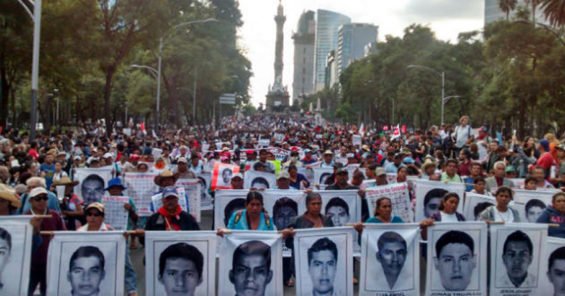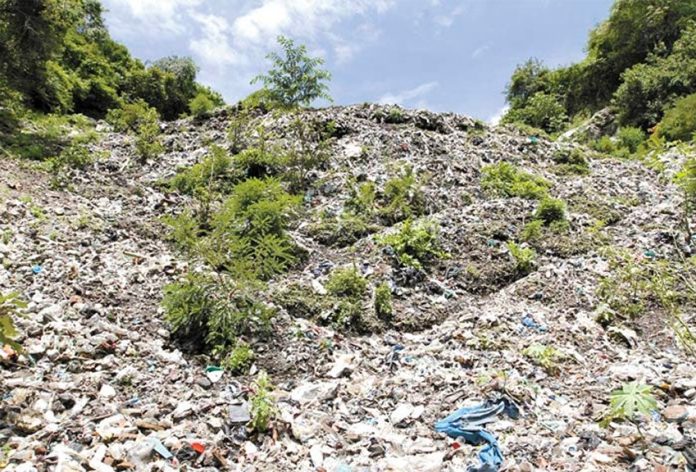A federal court has ordered the creation of a truth and justice commission to undertake a new investigation into the case of 43 students who disappeared in Iguala, Guerrero, in 2014.
Three judges of the Tamaulipas-based First Collegiate Tribunal made the decision unanimously yesterday based on the conclusion that the original investigation by the federal Attorney General’s office (PGR) was flawed.
The investigation “was not prompt, effective, independent or impartial on the part of the PGR, as the Inter-American Court of Human Rights’ precedent and the protocols adopted by the United Nations demand,” the ruling said.
The judges also criticized the PGR for failing to follow up leads that suggested that federal security forces were complicit in the students’ disappearance and for not examining evidence that people arrested in connection with the crime were tortured.
“There is no sign that they even explored the lines of investigation that signaled participation of personnel from the Mexican Army or the Federal Police . . . And on top of that it also appears that they have not investigated the torture, which implies that the personnel to which those acts are attributed have not been investigated, among them, members of the Mexican Navy.”
The court said the truth commission will be made up of victims’ families and their representatives and the National Human Rights Commission (CNDH) who will together direct and oversee the work of PGR prosecutors.
The decision adds legal weight to a position long argued by critics of the investigation and effectively orders the government to scrap its entire case and start anew.
According to the government’s “historic truth” — presented by former attorney general Jesús Murillo Karam on January 28, 2015 — the 43 students of the Ayotzinapa teacher training college were killed by a local drug gang after being handed over by corrupt municipal police.
Their bodies were later incinerated in the Cocula municipal dump and remains were discarded in a local river, Murillo said.
But journalists, activists, international experts, victims’ relatives and others rejected that version and questioned the role of the army in the students’ disappearance.
The New York Times said in a report published today that the government’s version never really explained the motive for the violent abductions, which left six people dead and a further 40 injured at the scene where the missing students were stopped in buses they had commandeered. The remains of only one student were identified.
Mass protests followed the students’ disappearance and the investigation into the case is widely regarded as the single biggest failing of the Enrique Peña Nieto-led government.
In accordance with the court’s ruling, the victims’ representatives and the CNDH will determine the lines of investigation to be followed in the new probe and may also call on national and international experts and human rights groups to contribute to the new investigation.
The PGR personnel who participate in the commission’s probe must not have been involved in the original investigation and the inclusion of any PGR forensic experts must be approved by the victims’ representatives and CNDH members, the court said.
The ruling also stipulated that members of the commission will have “free and immediate access” to all places where “there are motives to believe” that the disappeared students or their remains are or were, or where evidence that provides information regarding their whereabouts could be found “including places subject to military jurisdiction.”
The decision also called on President Peña Nieto to “give instructions to all the secretariats and departments that make up his cabinet so that, within the framework of their respective responsibilities, they provide their support and other aptitudes that the aforementioned commission requires to achieve its task.”
The court’s directive stemmed from an injunction filed by five defendants who accused the government of using torture against them in order to extract confessions.
The detained men’s claim is consistent with a United Nations (UN) report published in March which said that 34 people were tortured in connection with the investigation into the students’ disappearance.
PGR staff as well as personnel from the Federal Police and Navy Secretariat were involved in the process, the UN said.

The judges upheld the defendants’ injunction request and ruled that the investigations into the five men’s alleged crimes must be redone. The ruling, however, doesn’t allow for their release from custody.
The court said that new investigations into those who have been arrested must be carried out by independent experts in accordance with procedures established by the Istanbul Protocol, which provides guidelines for the investigation and assessment of people who have alleged that torture was used against them.
The court also submitted that victims’ families should be afforded compensation of 500,000 pesos (US $24,500) as a “partial advance so that the victims can meet their most pressing economic needs.”
Mario Patrón of the Centro Prodh human rights organization — which is representing the families of the missing students — described the ruling as a “massive blow for the government” and said that he couldn’t think of an historic precedent for the move.
The court said the order to create a truth commission was precipitated by an “unprecedented incident” and gave the government 10 days to comply.
But legal experts, including Chilean lawyer Francisco Cox, who participated in an international investigation into the case, questioned whether the government would even make an effort to carry out the measures given that it is nearing the end of its six-year term.
In a statement, the PGR responded to the decision by contending that the judges “do not recognize the separation of powers and the faculties of prosecution, investigation and criminal proceedings that correspond to the Attorney General’s office in accordance with article 21 of the constitution.”
The federal agency also said it would carry out an analysis of the ruling in order to determine what legal action it might take against it.
It could appeal the decision in the Supreme Court but given that the federal court ruling is definitive, the newspaper Milenio reported, it is unlikely it would be overturned.
Source: Milenio (sp), El Universal (sp), The New York Times (en)
